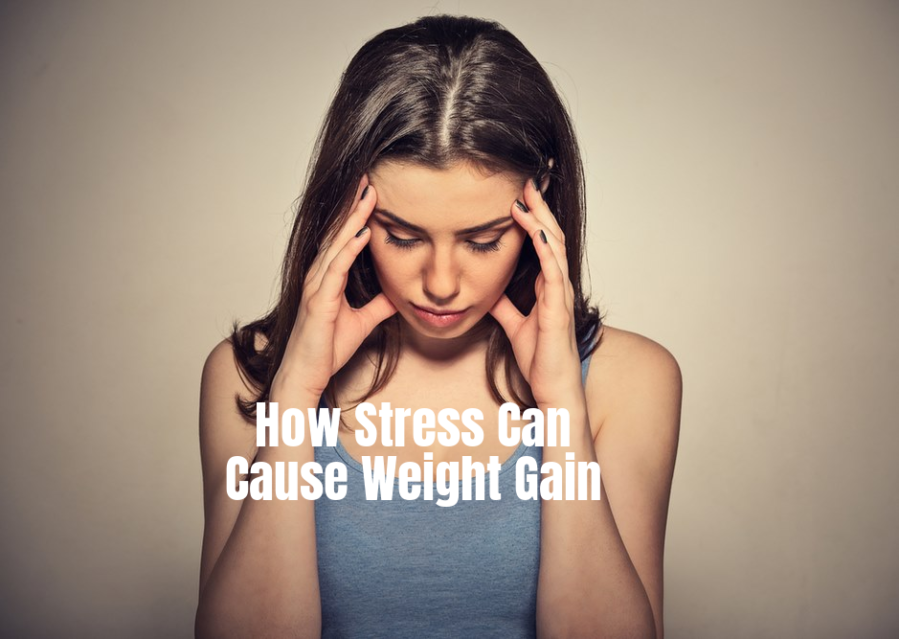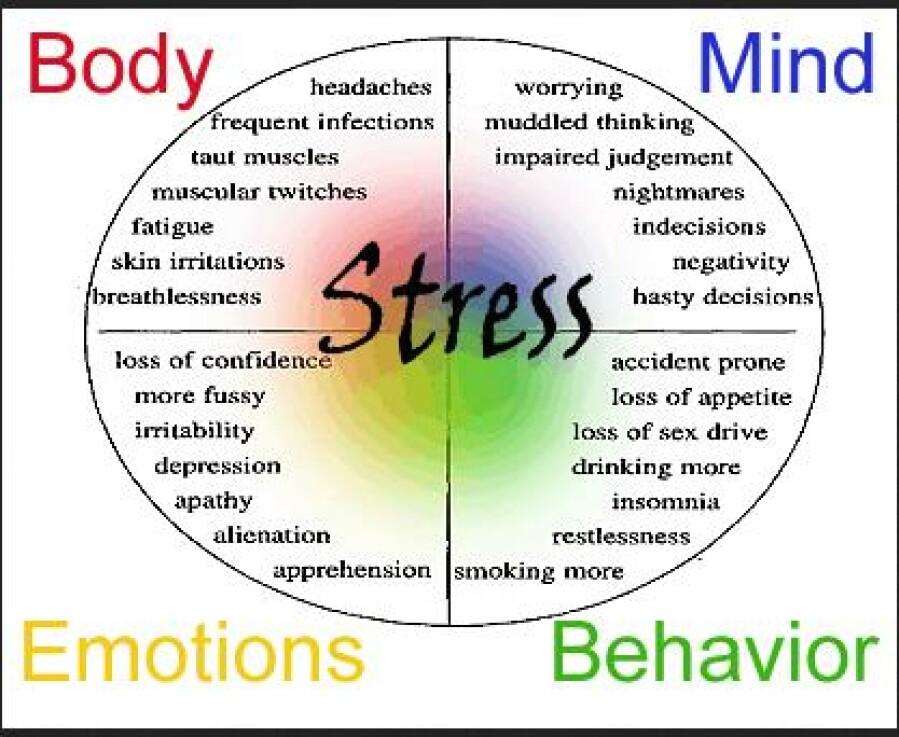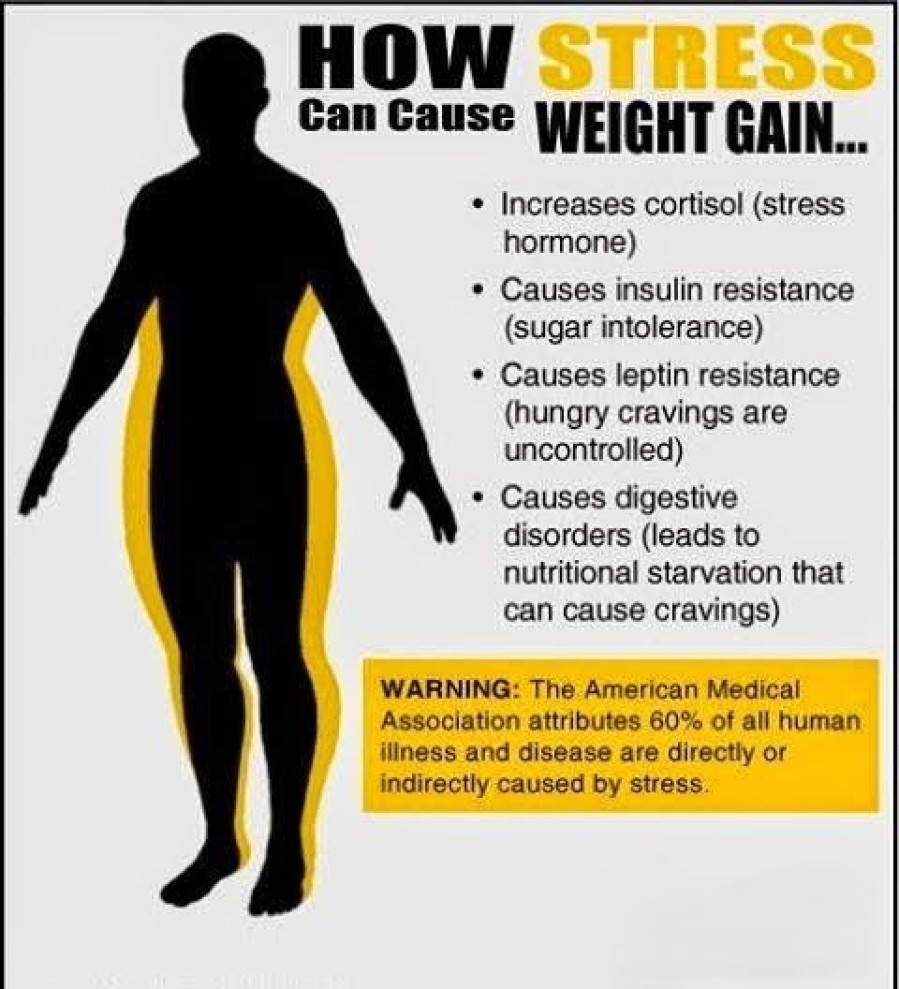
Have you ever noticed how stress makes everything harder – including managing your weight? If you’ve been feeling overwhelmed and struggling to lose weight, you’re not alone. Stress is more than just a mental load; it can affect your body and make weight loss an uphill battle.
When life gets stressful your body responds in ways that can affect your appetite, metabolism and where your body stores fat. It also adds temptation of comfort food during tough times and it’s no wonder stress is linked to weight struggles.
Here we go into how stress can cause weight gain, including the science behind stress hormones, emotional eating and how it impacts your overall health. Plus we’ll share practical tips to manage stress and support your weight loss. If stress has been holding you back, don’t worry – we’ve got you. Let’s get out of the cycle and take control!

How Stress Makes You Gain Weight
Stress affects many areas of our lives and one of them is weight gain. When we’re under stress our body responds in ways that can cause weight gain. By understanding how stress affects the body we can manage it effectively and prevent weight gain.
Also Read: What is the Best Exercise for Belly Fat Loss?
Hormonal Changes and Stress
Stress triggers the release of certain hormones and cortisol is the star of the show. Often called the “stress hormone” cortisol levels surge when we’re under pressure. Elevated cortisol can lead to:
- Increased appetite and cravings for sugary and high fat foods.
- Overeating in response to emotional or physical stress.
Other hormones also come into play in stress related weight changes:
Ghrelin: Known as the “hunger hormone” ghrelin levels rise under stress and makes us feel hungry.
Leptin: This hormone signals fullness but its effectiveness decreases during stress.
Insulin: While insulin regulates blood sugar, chronic stress can cause insulin resistance which leads to weight gain.
These hormonal changes create a vicious cycle: stress increases hunger and cravings, we overeat and gain weight. The weight gain then increases stress levels and the cycle continues. Breaking this cycle is key to maintaining a healthy weight.

Physical Responses to Stress
Stress doesn’t just affect hormones-it also affects physical activity and lifestyle habits such as:
Reduced activity: Stress can make us feel tired or unmotivated and we end up exercising less and being more sedentary.
Sleep disruptions: Stress can disrupt sleep quality which can:
- Increase hunger hormones like ghrelin.
- Slow down metabolism and make it harder to burn calories.
- Leave us with less energy for physical activities.
- Also stress makes the body store more fat especially in the abdominal area. This is driven by hormonal changes and the body’s natural response to prolonged stress.
Role Of Cortisol In Our Stress Management
Stress can have a significant impact on weight. Cortisol, a hormone released during stress, plays a key role. It affects various bodily functions, leading to weight gain. Understanding how cortisol influences appetite and fat storage can help manage stress-related weight issues.

Impact On Appetite
Stress often leads to an increase in appetite. Cortisol triggers this by affecting certain brain areas. These areas control feelings of hunger and satisfaction. When cortisol levels rise, people may crave high-calorie foods. This is because the body thinks it needs more energy to cope with stress. The result? Increased food intake and potential weight gain. Here are a few ways cortisol affects appetite:
- Increased cravings for sugary and fatty foods.
- Reduced sensitivity to feelings of fullness.
- Higher levels of ghrelin, the hunger hormone.
These factors combined can lead to overeating and unhealthy eating habits. It’s important to find ways to manage stress and control cortisol levels.
Fat Storage Mechanism
Stress also affects how the body stores fat. Cortisol plays a role in this process too. When cortisol levels are high, the body tends to store more fat, especially around the abdomen. This type of fat, known as visceral fat, is more dangerous. It surrounds vital organs and increases the risk of health problems. Some of these problems include diabetes, heart disease, and high blood pressure. Here is a table showing the difference between visceral fat and subcutaneous fat:
| Type of Fat | Location | Health Risks |
|---|---|---|
| Visceral Fat | Around internal organs | Higher risk of diseases |
| Subcutaneous Fat | Under the skin | Lower risk of diseases |
Managing stress and keeping cortisol levels in check is crucial. This can help prevent the accumulation of visceral fat. Simple practices like exercise, meditation, and healthy eating can make a big difference.
Stress Compels To Emotional Eating
Stress can affect our bodies in many ways. One of the most common issues is weight gain. Emotional eating often leads to consuming more calories than needed. This can cause extra pounds to pile on. Emotional eating happens when stress makes us eat to feel better. Let’s explore how stress influences our food choices and eating habits.

Comfort Food Zone For Emotional Eating
Comfort foods are often high in sugar, fat, and calories. These foods make us feel good temporarily. Stress increases cravings for these comfort foods. People tend to eat more ice cream, cookies, chips, and pizza when stressed. This is because these foods trigger the release of dopamine in the brain. Dopamine makes us feel happy and satisfied.

Choosing comfort foods can lead to unhealthy eating habits. The more we eat these foods, the more we crave them. This cycle can be hard to break. It’s important to understand why we reach for comfort foods. Knowing the reasons can help us make better choices. Here are some common comfort foods:
- Ice cream
- Chocolate
- Pizza
- Chips
- Cookies
These foods are often high in calories and low in nutrients. Eating them too often can lead to weight gain and other health problems. Finding healthier ways to cope with stress can help reduce the need for comfort foods. 
Stress Triggers Binge Eating
Binge eating is when a person eats a large amount of food in a short period. Stress can be a major trigger for binge eating. People may turn to food to cope with negative feelings. This can lead to eating even when not hungry. There are several triggers for binge eating:
- Feeling overwhelmed
- Sadness or depression
- Loneliness
- Anxiety
These triggers can make it hard to control eating habits. Recognizing these triggers is the first step to managing them. Finding healthy ways to deal with stress can help prevent binge eating. Some people find that exercise, meditation, or talking to a friend helps. These activities can reduce stress and the urge to binge eat. Here is a comparison of healthy coping strategies vs. binge eating:
| Healthy Coping Strategies | Binge Eating |
|---|---|
| Exercise | Eating large amounts of food |
| Meditation | Feeling guilty after eating |
| Talking to a friend | Eating when not hungry |
Making small changes can help reduce stress-related eating. Over time, these changes can lead to healthier habits and weight management.
Stress Disrupts Sleep Too!
Stress doesn’t just weigh on your mind—it can wreak havoc on your sleep as well. When you’re stressed, your body produces higher levels of cortisol, the stress hormone, which can make it difficult to relax and fall asleep. Racing thoughts and anxiety often accompany stress, keeping your mind active even when your body is tired.

This lack of quality sleep impacts your weight by increasing hunger hormones like ghrelin, reducing leptin (the hormone that signals fullness), and slowing down your metabolism. Poor sleep also leaves you feeling fatigued, which can lower your motivation to stay active and make healthier food choices. Addressing stress and improving sleep hygiene are key steps in managing your weight and overall health.
Stress Slowdowns Your Metabolism
Stress is a common part of life. But too much stress can cause weight gain. One way this happens is through metabolism slowdown. Our bodies react to stress by changing how they work. This includes the way we burn calories and our energy levels.
Caloric Burn Reduction
Stress can reduce the number of calories we burn. This process is called caloric burn reduction. When stressed, our bodies produce a hormone called cortisol. This hormone helps us deal with stress, but it also slows down our metabolism. Cortisol makes our bodies store more fat. It also makes us feel hungry. We may eat more, but our bodies burn fewer calories. This leads to weight gain. Here are some ways stress affects caloric burn:
- Increased Hunger: Stress makes us crave high-fat and high-sugar foods.
- Fat Storage: More cortisol means more fat stored, especially in the belly.
- Slowed Metabolism: Stress hormones slow down our body’s calorie-burning process.
These changes can make it hard to maintain a healthy weight. It is important to manage stress to prevent weight gain.
Energy Levels
Stress can also affect our energy levels. When we are stressed, our bodies use a lot of energy to cope. This can leave us feeling tired and drained. Low energy levels can make it hard to exercise. Without exercise, our bodies burn fewer calories. Here are some effects of stress on energy levels:
| Effect | Explanation |
|---|---|
| Fatigue | Stress can make us feel very tired. Even small tasks can feel hard. |
| Sleep Problems | Stress can keep us awake at night. Poor sleep reduces energy the next day. |
| Motivation | Stress can lower our motivation to be active. Less activity means fewer calories burned. |
Managing stress is important for keeping our energy levels up. This helps us stay active and burn more calories. Simple activities like walking, yoga, and deep breathing can help reduce stress. This can lead to better energy levels and a healthier weight.
How Stress Impacts On Your Lifestyle
Stress can play a significant role in weight gain. Our bodies react to stress in many ways, and these reactions can lead to an increase in weight. One major factor is our lifestyle. This includes how active we are and what we eat. Let’s explore how these lifestyle factors contribute to weight gain.

Sedentary Behavior
Sedentary behavior means spending a lot of time sitting or lying down. This lifestyle is common among people who work long hours at desks or spend much time watching TV. Lack of physical activity can lead to weight gain for several reasons:
- Reduced calorie burning: Sitting for long periods means fewer calories are burned.
- Muscle loss: Inactivity can lead to a decrease in muscle mass, which slows metabolism.
- Increased fat storage: The body stores more fat when not active.
In addition, stress can make us feel tired. This tiredness can make it harder to exercise. Less exercise means more weight gain. It becomes a cycle that is hard to break. To illustrate, here is a comparison between an active and a sedentary lifestyle:
| Lifestyle | Calories Burned (per hour) | Impact on Weight |
|---|---|---|
| Active | 300 | Helps maintain or lose weight |
| Sedentary | 100 | Contributes to weight gain |
Poor Dietary Choices
Stress often influences our food choices. Under stress, people may crave comfort foods that are high in sugar and fat. These foods can be tempting because they provide a quick energy boost and taste good. But they have a downside:
- High in calories: These foods add more calories than needed.
- Low in nutrients: They often lack the vitamins and minerals our bodies need.
- Addictive: Eating sugary and fatty foods can lead to more cravings.
Stress can also affect eating habits. Some might eat more when stressed, while others might skip meals. Irregular eating patterns can confuse the body’s hunger signals. This can lead to overeating later on. Furthermore, stress hormones like cortisol can increase appetite. Higher cortisol levels can make us feel hungrier and lead to weight gain. Here is a summary of how stress affects diet:
| Stress Factor | Effect on Eating | Impact on Weight |
|---|---|---|
| Craving comfort foods | Increased intake of high-calorie foods | Weight gain |
| Irregular eating patterns | Confused hunger signals | Weight gain |
| Higher cortisol levels | Increased appetite | Weight gain |
Stress Vs Mental Health Connection
Stress is a common part of modern life. It affects our bodies in many ways. One surprising impact is weight gain. The link between stress and weight is complex. Mental health plays a big role in this connection. Stress can lead to anxiety and depression. These mental health issues can then affect our weight. Understanding this connection is important. It can help us find ways to manage stress and maintain a healthy weight.

Anxiety And Weight Gain
Anxiety is a common mental health issue. It can cause many problems in our bodies. One of these problems is weight gain. Anxiety can make us eat more. This is called stress eating. Stress eating means eating food when we are not hungry. We eat to feel better. This can lead to weight gain. There are several ways anxiety can lead to weight gain:
- Increased cravings: Anxiety can make us crave unhealthy foods. These foods are often high in sugar and fat.
- Emotional eating: Anxiety can cause emotional eating. We eat to cope with our feelings.
- Decreased activity: Anxiety can make us less active. We may avoid exercise and other activities.
These factors can all lead to weight gain. Managing anxiety can help control weight. Relaxation techniques can be helpful. So can regular exercise and a healthy diet. Seeking support from a mental health professional is also a good idea.
Depression’s Influence
Depression is another mental health issue linked to weight gain. It affects our mood and energy levels. Depression can make us feel tired and unmotivated. This can lead to a less active lifestyle. We may also turn to food for comfort. Here are some ways depression can contribute to weight gain:
- Comfort eating: Depression can lead to comfort eating. We eat to feel better, even when not hungry.
- Low energy: Depression often causes low energy. This can make exercise difficult.
- Poor sleep: Depression can disrupt sleep. Poor sleep can affect weight by changing hormone levels.
Managing depression is important for weight control. Therapy and medication can help. So can a healthy lifestyle. Regular exercise, a balanced diet, and good sleep habits are key. Support from friends and family is also very important.
Also Read: A Guide to Brisk Walking For Rapid Weight Loss
How To Stress Manage Your Stress
Stress is a common part of life. But too much stress can lead to weight gain. This happens due to changes in our body’s hormones. These changes can make us eat more and exercise less. Managing stress can help prevent weight gain. Stress management techniques can improve our overall health and well-being.
Do Mindful Practices
Mindfulness is the practice of being present in the moment. It helps us to be aware of our thoughts and feelings. This awareness can reduce stress. Mindfulness practices can include:
- Meditation: Sitting quietly and focusing on your breath.
- Deep breathing: Taking slow, deep breaths to calm the mind.
- Progressive muscle relaxation: Tensing and then relaxing each muscle group.
- Mindful eating: Paying attention to the taste, smell, and texture of food.
These practices can help reduce the production of stress hormones. This can prevent stress-related weight gain. They can also improve our mood and help us feel more in control. Making mindfulness a daily habit can have lasting benefits.
Include Regular Physical Activity
Regular physical activity is important for managing stress. It helps reduce the levels of stress hormones in the body. Exercise can also increase the production of endorphins. These are chemicals in the brain that act as natural painkillers and mood elevators. Benefits of physical activity include:
- Improved mood: Exercise can help release tension and anxiety.
- Better sleep: Regular activity can improve sleep patterns.
- Increased energy: Physical activity can boost energy levels.
- Weight control: Exercise can help prevent weight gain by burning calories.
Even small amounts of physical activity can be beneficial. Activities like walking, jogging, and biking are good options. It’s important to find an activity that you enjoy. This will make it easier to stick with it. Consistency is key to reaping the benefits of physical activity.
Frequently Asked Questions
How Does Stress Lead To Weight Gain?
Stress triggers the release of cortisol. Elevated cortisol levels can increase appetite. This often leads to weight gain, especially around the abdomen.
Can Stress Cause Belly Fat?
Yes, chronic stress increases cortisol levels. This hormone promotes fat storage in the abdominal area, leading to belly fat.
Why Do I Eat More When Stressed?
Stress can lead to emotional eating. It triggers cravings for high-calorie, sugary foods, causing increased calorie intake.
Is Weight Gain Due To Stress Reversible?
Yes, managing stress through techniques like exercise, mindfulness, and healthy eating can help reverse stress-induced weight gain.
Conclusion
Stress and weight gain are closely linked, with hormonal imbalances, emotional eating, and lifestyle changes playing significant roles. While it’s natural to experience stress, understanding how it affects your body empowers you to take control. Focus on stress management techniques like mindfulness, meditation, or journaling. Prioritize regular physical activity and aim for quality sleep to support your body’s natural processes.
Remember, you’re not alone in this journey. Learning to recognize the effects of stress and making positive changes can lead to lasting improvements in your weight and overall well-being. By taking care of your mind and body, you can overcome the challenges of stress and create a healthier, more balanced life.









